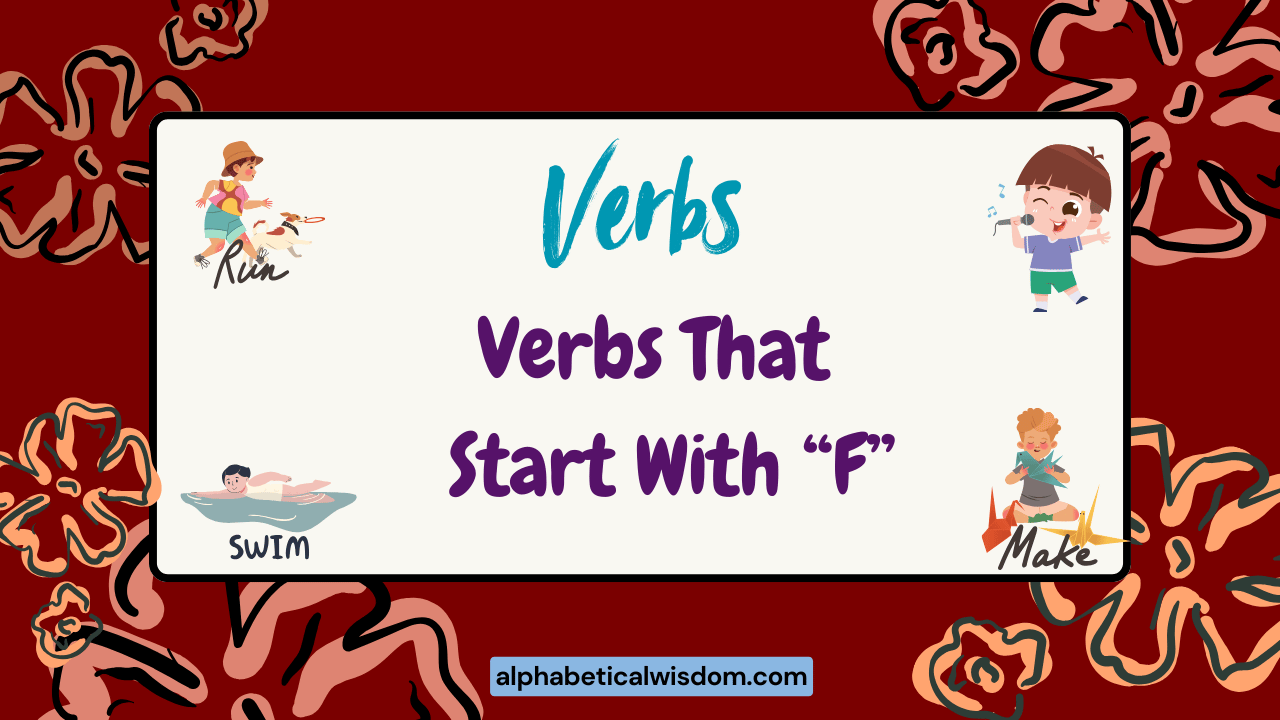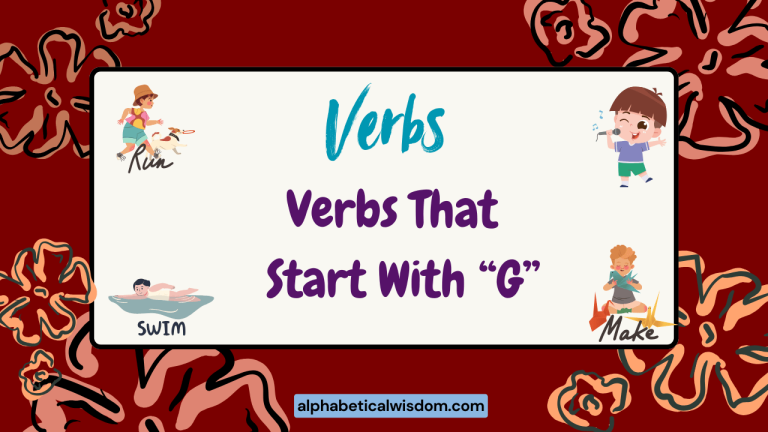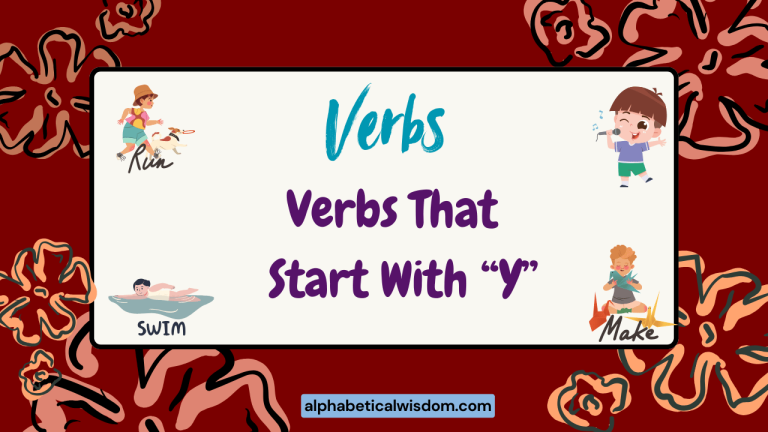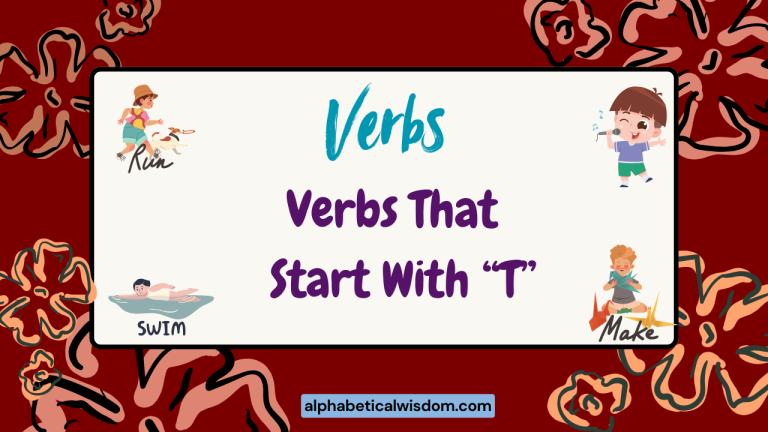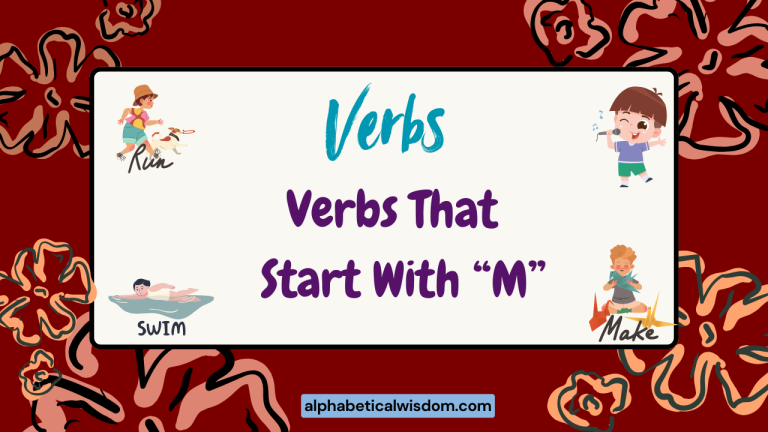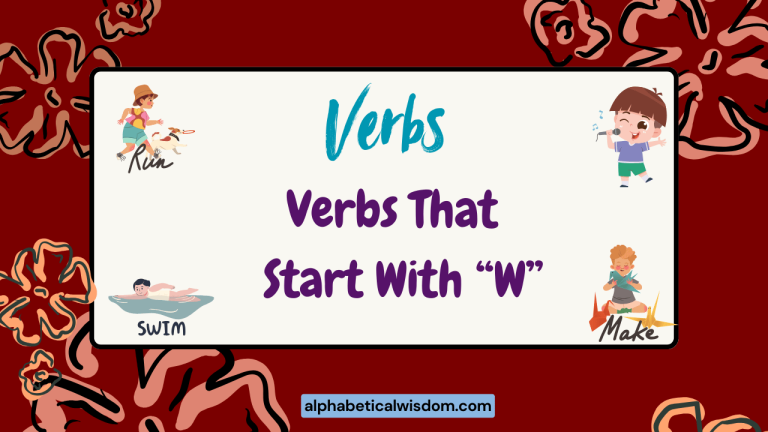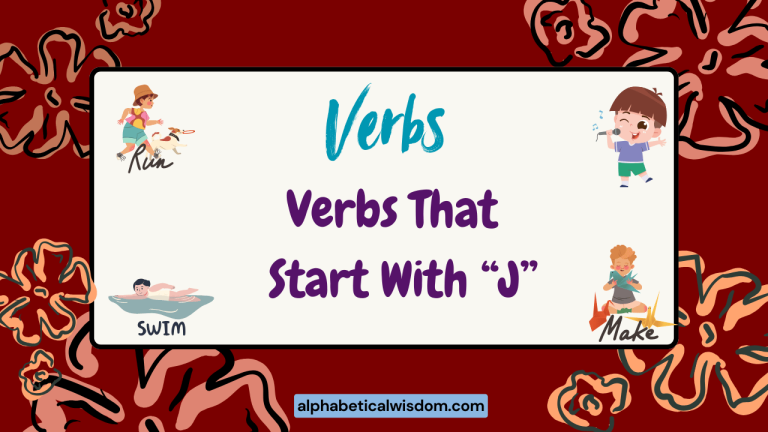Verbs That Start With F: A Comprehensive Guide
Understanding verbs that start with ‘F’ is crucial for expanding your vocabulary and improving your fluency in English. These verbs cover a wide range of actions, states, and processes, making them essential for effective communication.
This guide is designed for English language learners of all levels, from beginners to advanced speakers, and aims to provide a thorough understanding of these verbs through definitions, examples, and practice exercises.
Table of Contents
- Introduction
- Definition of Verbs Starting With ‘F’
- Structural Breakdown of ‘F’ Verbs
- Types and Categories of ‘F’ Verbs
- Examples of Verbs Starting With ‘F’
- Usage Rules for ‘F’ Verbs
- Common Mistakes with ‘F’ Verbs
- Practice Exercises
- Advanced Topics
- FAQ Section
- Conclusion
Definition of Verbs Starting With ‘F’
Verbs starting with the letter ‘F’ encompass a diverse set of actions, states, and occurrences in the English language. A verb, in general, is a word that describes an action, occurrence, or state of being.
Verbs that begin with ‘F’ are no exception, and they play a vital role in constructing meaningful sentences and conveying specific ideas.
These verbs can be classified into various categories based on their function and usage. For example, some are action verbs that describe physical or mental activities, while others are stative verbs that describe a state of being or a condition. Furthermore, they can be transitive verbs, requiring a direct object, or intransitive verbs, which do not. Understanding these classifications helps in using these verbs correctly and effectively.
The context in which a verb starting with ‘F’ is used significantly affects its meaning. For instance, the verb “feel” can describe a physical sensation (I feel cold) or an emotional state (I feel happy). Therefore, paying attention to the surrounding words and the overall situation is essential for accurate interpretation.
Structural Breakdown of ‘F’ Verbs
The structural breakdown of verbs starting with ‘F’ involves understanding their different forms and how they are used in sentences. Like all verbs, ‘F’ verbs have various forms, including the base form (infinitive), past tense, past participle, and present participle (gerund).
The base form is the infinitive form of the verb, usually preceded by “to” (e.g., to find, to follow, to forget). The past tense indicates an action or state that occurred in the past (e.g., found, followed, forgot). The past participle is used with auxiliary verbs like “have” or “be” to form perfect tenses or passive voice (e.g., have found, was followed, had forgotten). The present participle, ending in “-ing,” is used in continuous tenses (e.g., is finding, are following, was forgetting).
Many verbs starting with ‘F’ are regular, meaning their past tense and past participle forms are created by adding “-ed” to the base form (e.g., to follow – followed – followed). However, some are irregular and have unique past tense and past participle forms (e.g., to find – found – found, to forget – forgot – forgotten).
Knowing these irregular forms is crucial for correct usage. The structure and usage of these verbs also depend on the tense of the sentence and whether they are used in active or passive voice.
Types and Categories of ‘F’ Verbs
Verbs starting with ‘F’ can be categorized based on their function and how they are used in sentences. Understanding these categories helps in using the verbs correctly and effectively.
Action Verbs
Action verbs describe physical or mental activities. These verbs indicate something that someone or something does. They can be either transitive or intransitive.
Examples of action verbs starting with ‘F’ include: fight, find, fix, fly, fall, fetch, feed, finish, flee, float, fold, follow, force, forge, form, forward, foster, foul, frame, freeze, frighten, frisk, frolic, frown, frustrate, fulfil, fumble, function, fund, furnish, further, fuse.
Stative Verbs
Stative verbs describe a state of being, a condition, or a mental state. They usually do not describe an action that can be seen or felt in progress. Stative verbs often relate to thoughts, emotions, senses, or possession.
Examples of stative verbs starting with ‘F’ include: favor, fear, feel, figure, find, fit, flatter, favor, fancy, foresee, forget.
Transitive Verbs
Transitive verbs require a direct object to complete their meaning. The direct object is the person or thing that receives the action of the verb.
Examples of transitive verbs starting with ‘F’ include: find (I found my keys), follow (She followed the instructions), fix (He fixed the car), feed (They feed the birds), force (The wind forced the door open), forget (I forgot my wallet).
Intransitive Verbs
Intransitive verbs do not require a direct object. They express a complete thought on their own or with the help of adverbs or prepositional phrases.
Examples of intransitive verbs starting with ‘F’ include: fall (The leaves fall in autumn), fly (Birds fly in the sky), float (The boat floated on the water), flee (The refugees fled from the war zone), function (The machine functions perfectly), faint (She fainted from exhaustion).
Phrasal Verbs
Phrasal verbs are combinations of a verb and a preposition or adverb that create a new meaning. The meaning of a phrasal verb is often different from the meaning of the individual words.
Examples of phrasal verbs starting with ‘F’ include: fall apart (The old book fell apart), fall back (We had to fall back during the retreat), fall behind (He fell behind in his studies), fall for (She fell for his charm), figure out (I need to figure out the solution), fill in (Please fill in the form), find out (I want to find out the truth), follow up (I will follow up with an email), fend off (He fended off the attackers), freeze over (The lake froze over during the winter), face up to (He had to face up to his responsibilities), fall through (Our plans fell through), fit in (She tried to fit in with the group), fork out (They had to fork out a lot of money), freak out (He freaked out when he saw the spider), fuss over (She fussed over the baby).
Finite Verbs
Finite verbs are verbs that have a subject and show tense. They are typically the main verbs in a sentence and are conjugated to agree with the subject.
Examples of finite verbs starting with ‘F’ include: “She finds her keys,” “They followed the map,” “He fixes computers,” “I felt happy.”
Non-Finite Verbs
Non-finite verbs do not show tense or agreement with a subject. They include infinitives, gerunds, and participles.
Examples of non-finite verbs starting with ‘F’ include: “Finding a solution is crucial” (gerund), “I need to find my keys” (infinitive), “Fallen leaves covered the ground” (participle).
Examples of Verbs Starting With ‘F’
This section provides extensive examples of verbs starting with ‘F’ categorized by their type. Each table includes a variety of sentences to illustrate the different ways these verbs can be used.
Action Verb Examples
The following table provides examples of action verbs starting with ‘F’. These verbs describe physical or mental actions performed by a subject.
| Verb | Example Sentence |
|---|---|
| Fight | The soldiers fight bravely for their country. |
| Find | I hope I can find my lost wallet. |
| Fix | Can you fix the broken chair? |
| Fly | Birds fly south for the winter. |
| Fall | The leaves fall from the trees in autumn. |
| Fetch | Please fetch me a glass of water. |
| Feed | We feed the birds in the garden every morning. |
| Finish | I need to finish my homework before dinner. |
| Flee | People flee their homes during a war. |
| Float | The boat floats gently on the water. |
| Fold | She carefully folds her clothes. |
| Follow | Please follow the instructions carefully. |
| Force | The wind forced the door open. |
| Forge | They forge a strong alliance. |
| Form | The students form a study group. |
| Forward | I will forward the email to you. |
| Foster | We need to foster a sense of community. |
| Foul | The referee called a foul during the game. |
| Frame | They frame the picture with a wooden border. |
| Freeze | Water freezes at 0 degrees Celsius. |
| Frighten | Loud noises frighten the cat. |
| Frisk | The police frisk the suspect for weapons. |
| Frolic | The children frolic in the park. |
| Frown | He frowns when he is confused. |
| Frustrate | The difficult puzzle frustrates me. |
| Fulfill | He managed to fulfill all his promises. |
| Fumble | She fumbled with the keys in the dark. |
| Function | The machine functions perfectly. |
| Fund | The government funds the research project. |
| Furnish | They furnish the house with modern furniture. |
| Further | We need to further our understanding of the topic. |
| Fuse | The wires fuse together. |
Stative Verb Examples
The following table provides examples of stative verbs starting with ‘F’. These verbs describe states of being, conditions, or mental states.
| Verb | Example Sentence |
|---|---|
| Favor | I favor the blue dress over the red one. |
| Fear | I fear that we will be late. |
| Feel | I feel happy today. |
| Figure | I figure that it will rain tomorrow. |
| Find | I find it difficult to concentrate. |
| Fit | This shirt fits me perfectly. |
| Flatter | The dress flatters her figure. |
| Fancy | Do you fancy a cup of tea? |
| Foresee | I can’t foresee what will happen in the future. |
| Forget | I forget her name every time. |
Transitive Verb Examples
The following table provides examples of transitive verbs starting with ‘F’. These verbs require a direct object to complete their meaning.
| Verb | Example Sentence |
|---|---|
| Find | I found my keys on the table. |
| Follow | The dog followed its owner everywhere. |
| Fix | He fixed the broken bicycle. |
| Feed | She feeds the cat every morning. |
| Force | The heavy rain forced us to stay inside. |
| Forget | I often forget appointments. |
| Film | The director filmed the scene beautifully. |
| Finish | He finished his homework quickly. |
| Favor | The company favors internal candidates for promotions. |
| Fabricate | The journalist fabricated the story. |
| Facilitate | The teacher facilitated the discussion. |
| Factor | The company factored in potential losses. |
| Fail | He failed the exam despite studying. |
| Fake | They tried to fake the documents. |
| Falsify | He falsified the records to hide the truth. |
| Famish | The prisoners were famished by the cruel guards. |
| Fan | The celebrity fanned the flames of controversy. |
| Fantasize | She would often fantasize about winning the lottery. |
| Fashion | The artist fashioned the clay into a beautiful sculpture. |
| Fasten | Please fasten your seatbelts before takeoff. |
| Father | He fathered three children. |
| Fathom | I cannot fathom his reasons for doing that. |
| Favor | I favor the candidate with the most experience. |
| Fear | Many people fear public speaking. |
| Feature | The magazine features a famous actor on the cover. |
| Federalize | The government decided to federalize the local police force. |
| Federate | The small clubs decided to federate into a larger organization. |
| Fee | The museum fees all visitors over the age of 12. |
| Feign | He feigned illness to avoid going to work. |
| Fell | The lumberjack felled the tree with a single blow. |
Intransitive Verb Examples
The following table provides examples of intransitive verbs starting with ‘F’. These verbs do not require a direct object to complete their meaning.
| Verb | Example Sentence |
|---|---|
| Fall | The leaves fall in autumn. |
| Fly | Birds fly south for the winter. |
| Float | The boat floated on the calm water. |
| Flee | They had to flee from their homes. |
| Function | The printer functions perfectly now. |
| Faint | She fainted from the heat. |
| Fail | Despite his effort, the plan failed. |
| Falter | His voice faltered as he spoke of his loss. |
| Fare | How did they fare on their journey? |
| Fart | Excuse me, I need to fart. |
| Fast | Some people fast for religious reasons. |
| Fatigue | The soldiers fatigued after the long march. |
| Fault | The earth faulted during the earthquake. |
| Fawn | The employees fawned over the boss. |
| Feast | They feasted on delicious food at the party. |
| Ferment | The wine fermented in the cellar. |
| Fester | The wound festered due to neglect. |
| Fib | He fibbed about his age. |
| Fidget | The child fidgeted in his seat. |
| Fight | They fought bravely against the invaders. |
| File | The documents file easily in the cabinet. |
| Finalize | The deal should finalize by the end of the week. |
| Flag | Her energy began to flag as the day wore on. |
| Flam | The con artist tried to flam the tourists. |
| Flare | The fire flared up suddenly. |
| Flash | Lightning flashed across the sky. |
| Flatten | The dough flattened as she rolled it out. |
| Flatter | He flatters to get what he wants. |
| Flaunt | He flaunts his wealth. |
| Flee | The animals flee from the approaching fire. |
Phrasal Verb Examples
The following table provides examples of phrasal verbs starting with ‘F’. These verbs combine a verb with a preposition or adverb to create a new meaning.
| Verb | Example Sentence |
|---|---|
| Fall apart | The old car is starting to fall apart. |
| Fall back | The troops had to fall back to regroup. |
| Fall behind | He fell behind in his studies due to illness. |
| Fall for | She fell for his charm and good looks. |
| Figure out | I need to figure out how to solve this problem. |
| Fill in | Please fill in the application form. |
| Find out | I want to find out what happened. |
| Follow up | I will follow up with an email next week. |
| Fend off | He managed to fend off the attackers. |
| Freeze over | The lake froze over during the cold winter. |
| Face up to | He had to face up to his responsibilities. |
| Fall through | Our plans fell through because of the weather. |
| Fit in | She tried hard to fit in with the new group. |
| Fork out | They had to fork out a lot of money for repairs. |
| Freak out | He freaked out when he saw the spider. |
| Fuss over | She always fusses over her grandchildren. |
| Fall on | The responsibility fell on his shoulders. |
| Fiddle around | He likes to fiddle around with electronics. |
| Fight back | She fought back against the accusations. |
| File away | Please file away these documents. |
| Fill out | Please fill out this form. |
| Filter out | The system filters out spam emails. |
| Finish off | Let’s finish off this project. |
| Fire away | Okay, you can fire away with your questions. |
| Fish for | He was fishing for compliments. |
| Fix up | They plan to fix up the old house. |
| Flag down | We had to flag down a taxi. |
| Flash back | He flashed back to his childhood memories. |
| Flesh out | We need to flesh out the details of the plan. |
| Flip out | She flipped out when she heard the news. |
Usage Rules for ‘F’ Verbs
Using ‘F’ verbs correctly involves understanding and applying the rules of English grammar, including tense agreement, subject-verb agreement, and knowledge of irregular verb forms.
Tense Agreement
Tense agreement means that the verbs in a sentence must be consistent in tense unless there is a logical reason to change tense. For example, if the main verb is in the past tense, subsequent verbs should also be in the past tense, unless they describe a present or future action.
Incorrect: I found my keys after I will look everywhere.
Correct: I found my keys after I had looked everywhere.
Subject-Verb Agreement
Subject-verb agreement requires the verb to agree in number with its subject. If the subject is singular, the verb must be singular. If the subject is plural, the verb must be plural.
Incorrect: She follow the instructions carefully.
Correct: She follows the instructions carefully.
Irregular ‘F’ Verbs
Many verbs starting with ‘F’ are irregular, meaning their past tense and past participle forms do not follow the regular “-ed” pattern. It is important to memorize these forms to use them correctly.
For example:
- Find: find – found – found
- Fall: fall – fell – fallen
- Forget: forget – forgot – forgotten
- Feed: feed – fed – fed
- Flee: flee – fled – fled
Modal Verbs with ‘F’
Modal verbs such as “can,” “could,” “may,” “might,” “must,” “shall,” “should,” “will,” and “would” are often used with verbs starting with ‘F’ to express possibility, necessity, or permission.
Examples:
- I can find the solution.
- You must follow the rules.
- She might feel better tomorrow.
Common Mistakes with ‘F’ Verbs
Learners often make mistakes when using verbs starting with ‘F’. Here are some common errors and how to correct them:
| Incorrect | Correct | Explanation |
|---|---|---|
| I finded my keys. | I found my keys. | “Find” is an irregular verb; its past tense is “found,” not “finded.” |
| She falled down the stairs. | She fell down the stairs. | “Fall” is an irregular verb; its past tense is “fell,” not “falled.” |
| He forgetted his appointment. | He forgot his appointment. | “Forget” is an irregular verb; its past tense is “forgot,” not “forgetted.” |
| They feeded the animals. | They fed the animals. | “Feed” is an irregular verb; its past tense is “fed,” not “feeded.” |
| I am feeling that it will rain. | I feel that it will rain. | “Feel” as a verb of perception is usually not used in the continuous tense. |
| She is fearing the dark. | She fears the dark. | “Fear” as a state verb is usually not used in the continuous tense. |
| He falled behind on his payments. | He fell behind on his payments. | “Fall” is an irregular verb; its past tense is “fell,” not “falled.” |
Practice Exercises
These exercises will help you practice using verbs starting with ‘F’ correctly. Each exercise focuses on different aspects of verb usage, including tense, subject-verb agreement, and irregular verb forms.
Exercise 1: Fill in the Blanks
Fill in the blanks with the correct form of the verb in parentheses.
| Question | Answer |
|---|---|
| 1. I ________ (find) my wallet this morning. | found |
| 2. She ________ (follow) the instructions carefully. | followed |
| 3. He ________ (fix) the car yesterday. | fixed |
| 4. They ________ (feed) the birds every day. | feed |
| 5. The leaves ________ (fall) from the trees in autumn. | fall |
| 6. She ________ (feel) happy today. | feels |
| 7. I always ________ (forget) his name. | forget |
| 8. The refugees ________ (flee) from the war zone. | fled |
| 9. Water ________ (freeze) at 0 degrees Celsius. | freezes |
| 10. He ________ (figure) out the solution. | figured |
Exercise 2: Correct the Errors
Identify and correct the errors in the following sentences.
| Question | Answer |
|---|---|
| 1. I finded my keys on the table. | I found my keys on the table. |
| 2. She falled down and hurt her knee. | She fell down and hurt her knee. |
| 3. He forgetted to bring his wallet. | He forgot to bring his wallet. |
| 4. They feeded the animals in the zoo. | They fed the animals in the zoo. |
| 5. She is feeling that something is wrong. | She feels that something is wrong. |
| 6. He is fearing spiders. | He fears spiders. |
| 7. The plan faileded due to lack of funds. | The plan failed due to lack of funds. |
| 8. She flaunted her new dress at the party. | Correct. |
| 9. He
frowned when he heard the bad news. |
Correct. |
| 10. They falled behind in their payments. | They fell behind in their payments. |
Exercise 3: Sentence Construction
Construct sentences using the verbs provided below. Ensure correct tense and subject-verb agreement.
| Verb | Example Sentence |
|---|---|
| Find | I need to find a new job. |
| Follow | The children followed the leader. |
| Fix | He will fix the computer tomorrow. |
| Feed | We feed our pets twice a day. |
| Fall | The apple fell from the tree. |
| Flee | The villagers fled the burning village. |
| Function | The new software functions seamlessly. |
| Forget | Don’t forget to lock the door. |
| Freeze | The pipes froze during the winter. |
| Frighten | Loud noises frighten small children. |
Exercise 4: Verb Conjugation
Conjugate the following verbs in the tenses indicated.
| Verb | Present Simple | Past Simple | Future Simple | Present Continuous |
|---|---|---|---|---|
| Find | I find | I found | I will find | I am finding |
| Fall | I fall | I fell | I will fall | I am falling |
| Forget | I forget | I forgot | I will forget | I am forgetting |
| Flee | I flee | I fled | I will flee | I am fleeing |
| Feed | I feed | I fed | I will feed | I am feeding |
Advanced Topics
For advanced learners, understanding the subjunctive mood and conditional sentences can further enhance their ability to use ‘F’ verbs correctly and effectively.
Subjunctive Mood
The subjunctive mood is used to express wishes, suggestions, or hypothetical situations. It often involves using the base form of the verb, regardless of the subject.
Example:
- I suggest that he follow the doctor’s advice.
- It is important that she find a solution quickly.
Conditional Sentences
Conditional sentences express situations that depend on certain conditions. They often use the word “if” and involve different verb tenses depending on the type of condition.
Examples:
- If I find my keys, I will go to the party. (Type 1: Possible condition)
- If I found a million dollars, I would travel the world. (Type 2: Hypothetical condition)
- If I had found my keys earlier, I would have been on time. (Type 3: Impossible condition in the past)
FAQ Section
Q: How do I know if a verb starting with ‘F’ is transitive or intransitive?
A: A transitive verb requires a direct object to complete its meaning, while an intransitive verb does not. If you can ask “verb + whom/what?” and get a sensible answer, the verb is transitive. For example, “I found what? I found my keys” (transitive). “She fled where?” doesn’t make sense, so “fled” is intransitive.
Q: Are there any common idioms using verbs starting with ‘F’?
A: Yes, there are many idioms. For instance, “face the music” means to accept the consequences of your actions, and “fall by the wayside” means to fail to succeed or be completed.
Q: How can I improve my understanding of irregular ‘F’ verbs?
A: The best way to improve is through practice and memorization. Create flashcards, use the verbs in sentences, and review them regularly. Online resources and verb conjugation tools can also be helpful.
Q: Can stative verbs starting with ‘F’ ever be used in continuous tenses?
A: Generally, stative verbs are not used in continuous tenses. However, some stative verbs like “feel” can be used in continuous tenses when they describe an action rather than a state. For example, “I am feeling the fabric” (action) vs. “I feel happy” (state).
Conclusion
Mastering verbs that start with ‘F’ is an essential step in enhancing your English language skills. By understanding their definitions, structural forms, and usage rules, you can communicate more effectively and confidently.
Regular practice and attention to common mistakes will further refine your proficiency. Keep exploring and using these verbs in various contexts to solidify your knowledge and fluency.
